100th Anniversary Great Nave Tour at the Cathedral of St. John the Divine
Celebrate the 1925 construction of the stunning nave inside the world's largest Gothic cathedral!


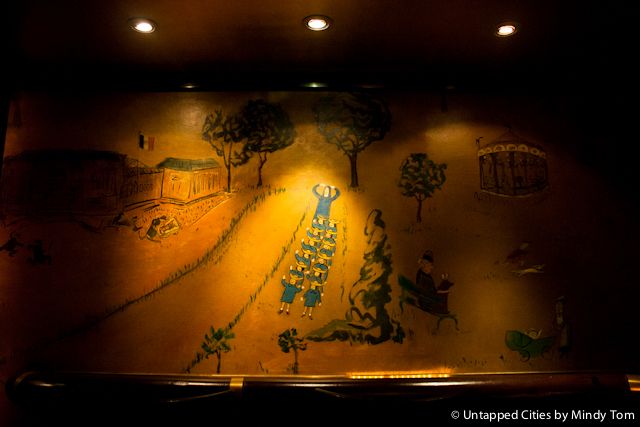
In addition to being the setting for numerous films and novels, New York City maintains a special connection with children’s literature. Scores of authors set their stories here, which makes New York City a fairytale world for many children. New York City also possesses a marvelous array of sites associated with well-known works of children’s literature. So for your children or your inner child, here is our guide to sites where children’s stories come alive in New York City.
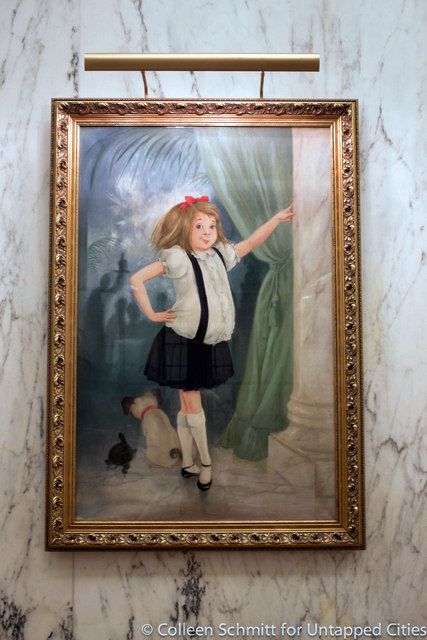
In 1955, Eloise was published. Written by Kay Thompson and Hilary Knight, the book followed the adventures of six year old Eloise who lived on the top floor of the Plaza Hotel. The books, and its sequels, have been accepted by the Plaza as a part of its heritage. A portrait of Eloise hangs in the hotel’s lobby and the Eloise store allows readers to “dress up, so mini-Eloises can model their favorite looks from the podium…enjoy ‘park views’ and watch their favorite Eloise movie clips, or enjoy story time.” The store even hosts birthday parties. At the Eloise Tricycle Garage, children can rent Radio Flyer tricycles, children bikes and scooters (in addition to bicycles).
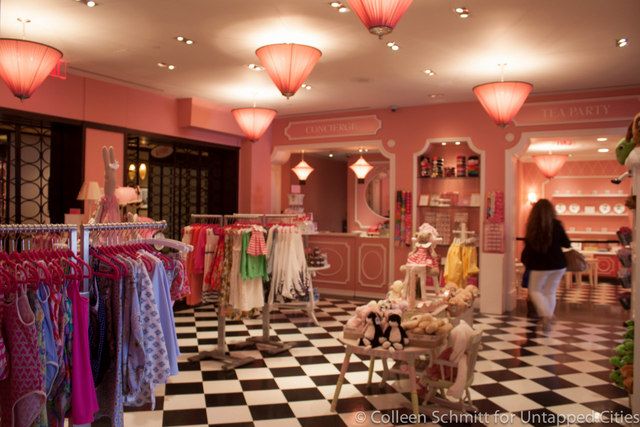 The Eloise Store in the Plaza Hotel
The Eloise Store in the Plaza Hotel
 Original Winnie the Pooh and friends dolls. Photo courtesy New York Public Library
Original Winnie the Pooh and friends dolls. Photo courtesy New York Public Library
In 1987, E.P. Dutton, the American publisher of the Winnie the Pooh books donated the eponymous stuffed animal to the New York Public Library. Winnie the Pooh currently resides along with Kanga, Piglet, Eeyore, and Tigger in the Children’s Center of the New York Public Library’s Main Branch. The stuffed animals, which served as the inspiration for the stories were a first birthday present, purchased at Harrods, to Christopher Robin Milne.

In exchange for one and a half years of room and board for himself and his family, Ludwig Bemelmans, author of the Madeline books, painted the walls at the Hotel Carlyle Bar in 1947. As a result, the bar was renamed Bemelmans Bar. The murals depict Central Park throughout the seasons with a cameo by Madeline. If the murals do not quench your thirst for Madeline, perhaps the bar’s Madeline’s Buffet will do the trick. Bemelmans Bar was also featured in our list of the Top 10 Bars where a drink is served with a work of art.

The Little Red Lighthouse under the George Washington Bridge
The North Hook Beacon was constructed in 1889 and served Sandy Hook, New Jersey. It stood there until 1917 when it was reconstructed on Jeffrey’s Hook four years later. It maintained an active lighthouse until 1947, by which time it was deemed obsolete due to the illumination from the George Washington Bridge. In 1951, the lighthouse was slated for demolition to be sold as scrap. An outcry of public support, which is said to have been the direct result of the children’s book, The Little Red Lighthouse and the Great Gray Bridge, saved the lighthouse. The lighthouse was transferred to the New York City Parks Department and is now a member of the Historic House Trust. A handful of times a year, the lighthouse is open to the public. The little book that could was written in 1942 by Hildegarde Swift, illustrated by Lynd Ward. Though less well known today, the book is a classic and worthwhile addition to any library.
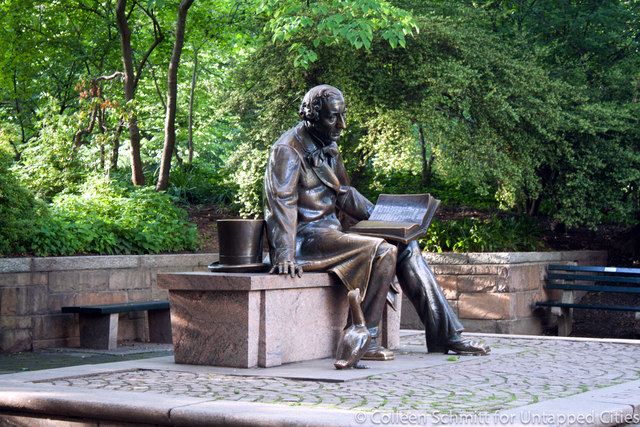
In 1955, to commemorate the 150th anniversary of Hans Christian Andersen’s birthday, the Danish American Women’s Association sponsored a sculpture of the author. Danish and American schoolchildren together helped to raise the $75,000 necessary to build this work of art. Georg John Lober designed the larger than life sculpture of Andersen sitting down looking towards his Ugly Duckling, whose story he has open on his lap. Since 1956, the statue in Central Park has served as the location for children’s reading events.
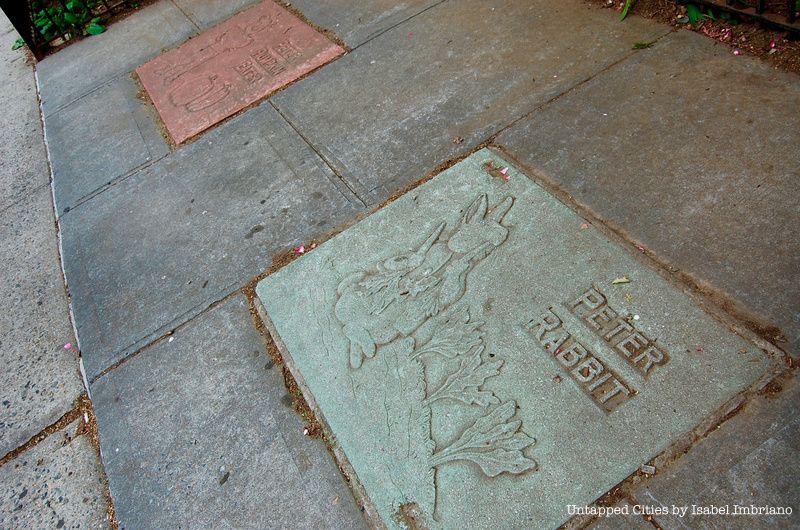
Peter’s Field was named after Peter Stuyvesant and Peter Cooper, two prominent New Yorkers. The park is administered by the New York City Parks Department and the Board of Education and is located between East 20th Street and East 21st Street between 1st Avenue and 2nd Avenue. Since Stuyvesant and Cooper are historical figures unrelated to children’s literature, it is a later addition to this park that affords it a place on this list. A series of concrete plaques, located off of 2nd Avenue, depict other famous Peters. Included in this sidewalk art are Peter Pan, Peter Parker (Spider Man), Peter Piper (who picked a peck of pickled peppers), Peter (Peter) Pumpkin Eater, Peter Rabbit, and Peter (and the Wolf).
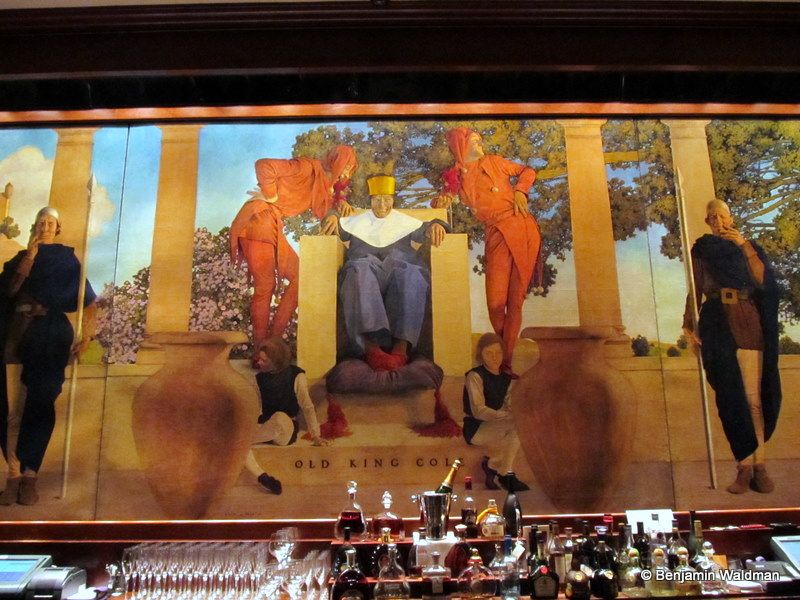
The King Cole Bar, located in the St. Regis Hotel, is famous for its namesake mural and for being the birthplace of the Bloody Mary cocktail. The mural, painted by illustrator Maxfield Parrish, was originally commissioned by John Jacob Astor IV in 1909 for his Knickerbocker Hotel. Parrish was reluctant to paint the mural due to his Quaker upbringing but ultimately agreed for the sum of $5,000. Old King Cole is thought to have been modeled on Astor, but there does not appear to be any resemblance between the two. It’s easy to forget that King Cole is the subject of a children’s nursery rhyme, but Old King Cole has certainly been a merry old soul, overseeing this historic bar for over a century.
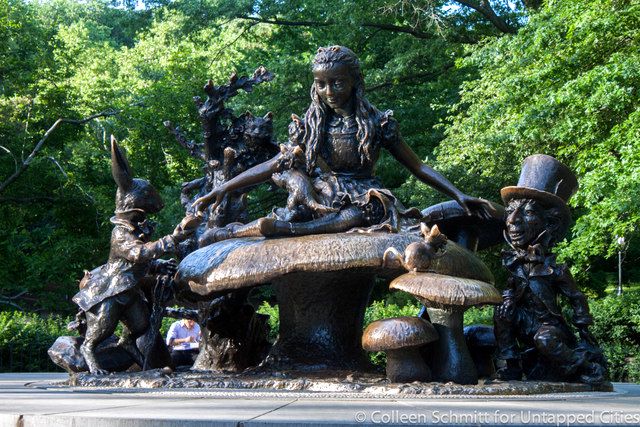
José de Creeft’s 1959 Alice in Wonderland sculpture is a favorite amongst children (and the children at heart) in Central Park. The statue depicts Alice atop a mushroom surrounded by the White Rabbit, the Cheshire Cat, the Mad Hatter, the Dormouse, and Dinah. The Mad Hatter is a caricature of George Delacorte and Alice is based on the sculptor’s daughter Donna. Seven bronze tablets surround the sculpture containing a dedication and quotes from the Lewis Carroll books. We previously covered Carroll’s inspiration for Alice, which can be uncovered in Oxford.
Located just north of 72nd Street on the east side of Central Park, the Conservatory Water is the only remnant of a Central Park that Never Was. A former flower garden and a large conservatory for tropical plants accompanied by a reflecting pool were part of the Park’s original plan. However, only the pool was built. When the idea for the conservatory was completely abandoned, the pond was transformed into a space for model boats, modeled on similar ponds in Parisian parks including the Luxembourg Gardens. The pond is most well known for its appearance in E. B. White’s 1945 novel Stuart Little. In the book, the Stuart Little, a mouse, participates in a boat race in the Conservatory Water (which was also featured in the film version). From April through October, visitors can rent model boats, thereby reliving their childhood fantasy.
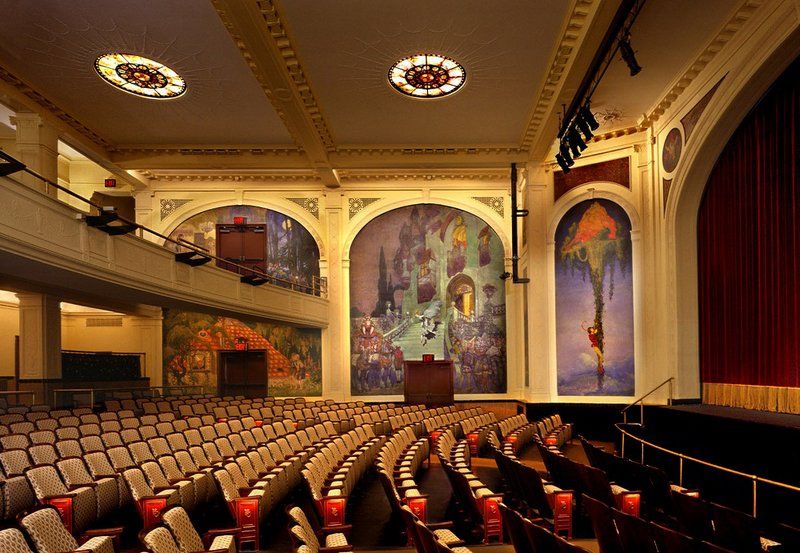
Photo courtesy El Museo del Barrio
The Heckscher Theatre was constructed in 1922, in the Heckscher Foundation for Children at 1230 Fifth Avenue. It was built to house free productions for orphans and sick children and went on to host W.P.A. Federal Theatre Project’s Theatre for Youth program in the 1930s and was the original site for the Joseph Papp New York Shakespeare Festival. Today, the building is used by El Museo del Barrio. The illustrator Willy Pogany designed the pre-Raphaelite murals decorating the theater’s walls. The murals depict scenes from children’s stories including “Hansel and Gretel,” “Jack and the Beanstalk,” “Sleeping Beauty,” “Little Red Riding Hood.”
Subscribe to our newsletter